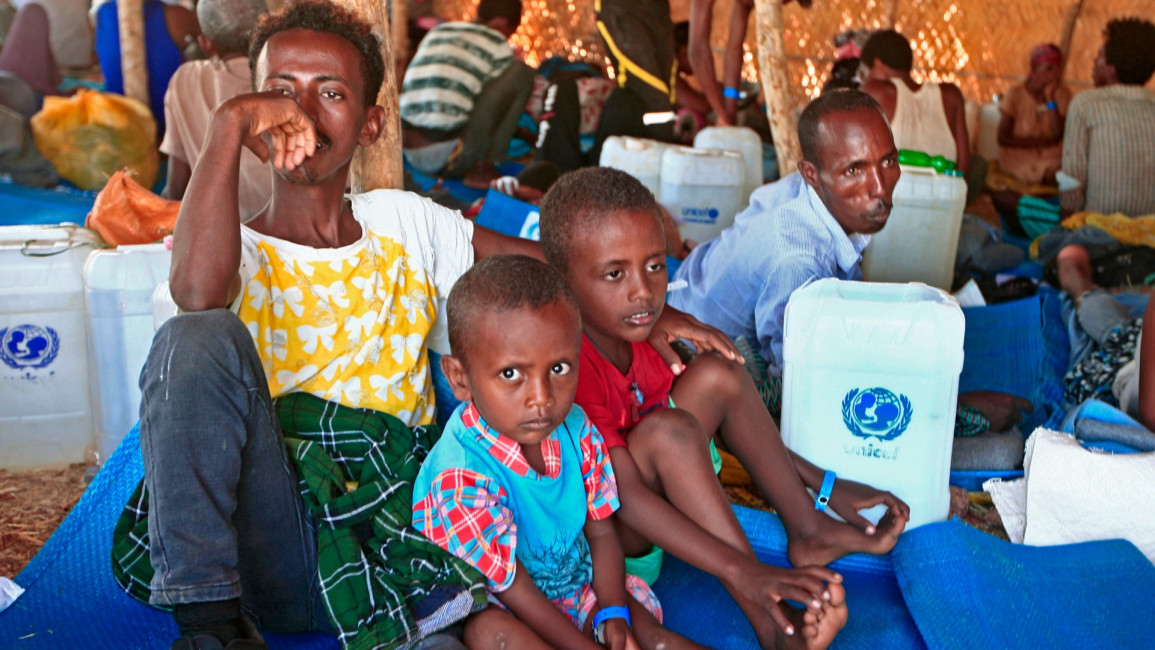Follow us on Facebook, Twitter and Instagram to stay connected
Children crossing the border into Sudan 'extremely vulnerable': Save the Children
Children crossing the border into Sudan 'extremely vulnerable': Save the Children
A new report by a leading NGO has warned that children crossing the border into Sudan face growing risks to their lives.
3 min read
Ethiopian refugees who fled fighting in Tigray at a camp in Sudan [Getty]
Children crossing the border from Ethiopia into Sudan are at risk from being separated from their family, and a whole host of other dangers, a new report by Save the Children warned today.
Over the past few weeks some 27,000 people have crossed the border into Sudan to escape the violence in Tigray, and an increasing number of those are children, according to the UN.
"Children are extremely vulnerable in these situations; they might have seen violence, or have lost family members. In any case they had to leave everything behind, their homes, their possessions, their friends and their school. They will not always understand what’s going on, and all this can have a deep impact on children," said Arshad Malik, country director of Save the Children in Sudan.
"The areas where people are arriving have not seen refugees in two decades, so there's not much there to shelter the new arrivals. They need clean water, food, a place to sleep, medical care - and children need safety, places where they feel protected and where they can catch their breath.
Mailk said that Sudan is already facing its own hunger crisis, recovering from recent floods, and also has large numbers of displaced people who have fled violence.
Sudan's Commissioner for Refugees Abdullah Suleiman toured the border region Gadaref and Kassala earlier this month with UN refugee agency assistant representative in Sudan, Jan Hansmann, to discuss the influx of refugees fleeing the fighting.
|
Hansmann, quoted by SUNA, said the priority of the UNHCR was to provide the refugees with shelter, food and water and then to transfer them to regions far from the border "for security reasons".
He said the UN refugee agency was working to establish new camps in Sudan for the Ethiopians.
Sudan has already said it would shelter thousands of Ethiopians fleeing the conflict at the Um Raquba camp, which in the 1980s hosted thousands of Ethiopian fleeing famine.
Over the past month, exhausted refugees have streamed across the border into Sudan after walking for two-days through searing heat, many of them barefoot.
Some arrived on scooters and others cycled, while some boarded makeshift boats to cross a river into Sudan to flee intense fighting at home.
Suleiman called on the international community to pitch in with aid for the refugees.
Ethiopian Prime Minister Abiy Ahmed announced 4 November that he had ordered military operations in Tigray in a dramatic escalation of a long-running feud with the region's ruling party, the Tigray People's Liberation Front (TPLF).
UNHCR said it expected the number of refugees to grow if the conflict in neighbouring Ethiopia worsens.
The leader of the Tigray region on Sunday claimed responsibility for rocket strikes on the airport of neighbouring Eritrea's capital, sparking fears that the conflict could widen.
A Sudanese government source said up to 200,000 Ethiopians could seek shelter in Sudan.


![President Pezeshkian has denounced Israel's attacks on Lebanon [Getty]](/sites/default/files/styles/image_684x385/public/2173482924.jpeg?h=a5f2f23a&itok=q3evVtko)



 Follow the Middle East's top stories in English at The New Arab on Google News
Follow the Middle East's top stories in English at The New Arab on Google News


